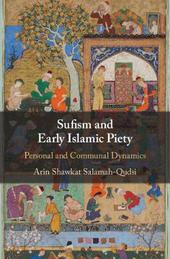
|
Sufism and Early Islamic Piety: Personal and Communal Dynamics
Hardback
Main Details
| Title |
Sufism and Early Islamic Piety: Personal and Communal Dynamics
|
| Authors and Contributors |
By (author) Arin Shawkat Salamah-Qudsi
|
| Physical Properties |
| Format:Hardback | | Pages:330 | | Dimensions(mm): Height 235,Width 158 |
|
| Category/Genre | Religion and beliefs
Islam
Sufism and Islamic mysticism |
|---|
| ISBN/Barcode |
9781108422710
|
| Classifications | Dewey:297.409 |
|---|
| Audience | | Professional & Vocational | |
|---|
| Illustrations |
Worked examples or Exercises
|
|
Publishing Details |
| Publisher |
Cambridge University Press
|
| Imprint |
Cambridge University Press
|
| Publication Date |
8 November 2018 |
| Publication Country |
United Kingdom
|
Description
Sufism and Early Islamic Piety: Personal and Communal Dynamics offers a new story about the formative period of Sufism. Through a fresh reading of diverse Sufi and non-Sufi sources, Arin Shawkat Salamah-Qudsi reveals the complexity of personal and communal aspects of Sufi piety in the period between the ninth and thirteenth centuries. Her study also sheds light on the interrelationships and conflicts of early Sufis through emphasising that early Sufism was neither a quietist or a completely individual mode of piety. Salamah-Qudsi reveals how the early Sufis' commitment to the Islamic ideal of family life lead to different creative arrangements among them in order to avoid contradictions with this ideal and the mystical ideal of solitary life. Her book enables a deeper understanding of the development of Sufism in light of the human concerns and motivations of its founders.
Author Biography
Arin Shawkat Salamah-Qudsi is a lecturer of Sufi and Islamic studies at the University of Haifa, Israel. Her research focuses on Medieval Sufi literature and doctrines, the role and position of women in early Sufism, Sufi autobiographies, and Sufism and society in early medieval Islam. In 2011, Dr Salamah-Qudsi obtained Ma'uf fellowship for Outstanding Arab Lecturers, the Council of Higher Education.
Reviews'By expanding the scope of inquiry about the relationships of early Sufis beyond the celebrated shaykh-disciple bond, Sufism and Early Islamic Piety makes an undeniable contribution to scholarship on early Sufism. Among other achievements, Salamah-Qudsi highlights figures who have previously been marginalized in European-language scholarship, argues persuasively for the application of gen-der theory to early Sufi texts, and translates for the first time a great deal of material into English ...' Jeremy Farrell, Journal of the American Oriental Society
|